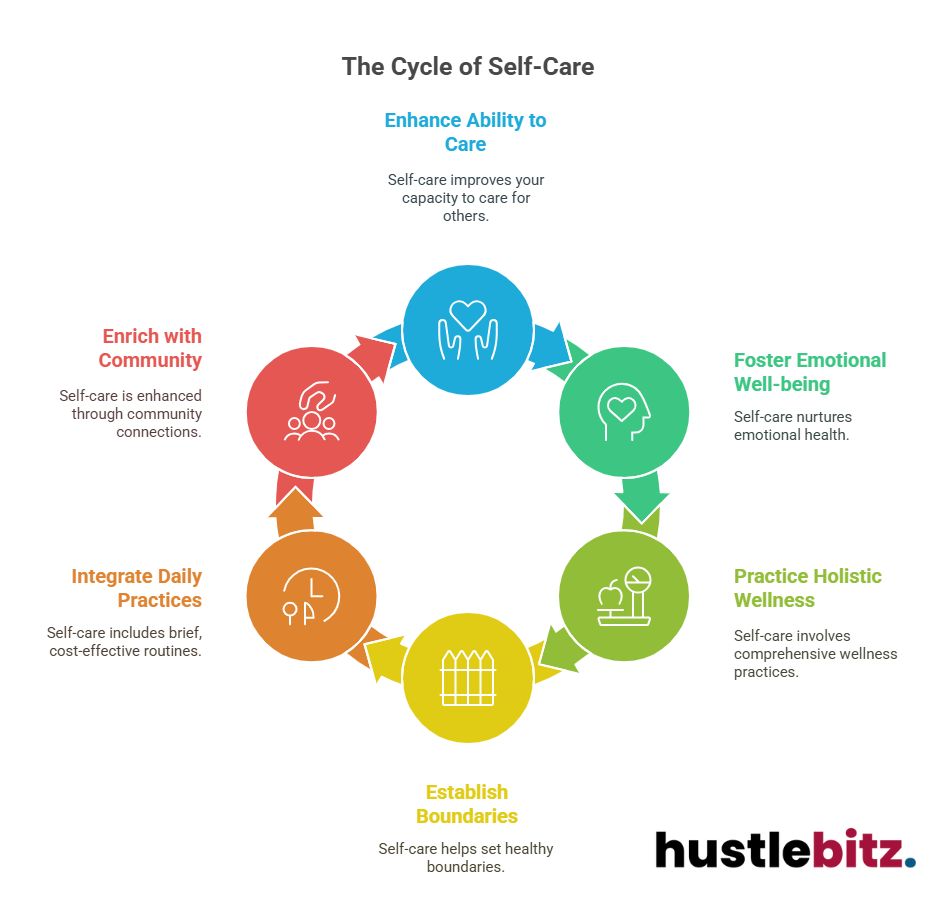Several myths about self-care hinder its effective implementation. Many believe self-care is selfish, while it actually enhances one’s ability to care for others. Others assume self-care involves only luxurious spa days or expensive activities, overlooking practical, cost-effective strategies like mindfulness and journaling. The misconception that self-care is merely indulgent or a temporary fix also persists. In truth, it encompasses sustainable practices that promote emotional and physical well-being. Personalization is essential, as one size does not fit all. Understanding these myths is the first step to unlocking the full benefits of self-care in your life.
Key Takeaways
- Many believe self-care is selfish, but it actually enhances your ability to care for others and fosters emotional well-being.
- Self-care is often mistaken for relaxation only; it encompasses holistic wellness practices that include emotional healing and establishing boundaries.
- Some view self-care as indulgent, yet it is a vital component of health, including mindfulness, exercise, nutrition, and quality sleep.
- It’s a myth that self-care requires significant time or money; brief, cost-effective practices can be integrated into daily routines for emotional benefits.
- People often think self-care is a solitary endeavor, but community connections and shared experiences greatly enrich the self-care journey.

Self-Care Is Selfish
The misconception that self-care is selfish undermines the essential truth that prioritizing one’s own well-being enhances the capacity to care for others effectively. Engaging in self-care is not merely an indulgence; it is a vital practice that fosters emotional well-being and personal growth. When individuals invest time in nurturing themselves, they become more resilient and better equipped to support their communities.
Self-care benefits extend beyond the individual, creating a ripple effect that positively influences those around them. Daily practices such as mindfulness, exercise, and adequate rest rejuvenate both the mind and body. By maintaining a healthy balance, individuals cultivate the energy and focus necessary to serve others meaningfully. Furthermore, practices rooted in self-care promote emotional regulation, allowing individuals to approach challenges with clarity and compassion.
In a society that often emphasizes self-sacrifice, it is crucial to recognize that caring for oneself is not at odds with community support. Rather, it strengthens one’s ability to contribute. When individuals prioritize their well-being, they become more engaged and effective advocates for others, fostering an environment where support and empathy flourish.
Ultimately, embracing self-care as a fundamental aspect of life empowers individuals to thrive personally and collectively. By challenging the notion that self-care is selfish, we can create a culture that values well-being as a cornerstone for enriched relationships and robust community engagement.
Only Spa Days Count

What if self-care encompasses far more than just luxurious spa days, extending instead to everyday practices that nurture mental, emotional, and physical well-being? Engaging in mindful moments, daily rituals, and emotional check-ins can be as rejuvenating as a day at the spa. Recognizing that self-care is not limited to extravagant activities allows us to create a sustainable practice that also serves others.
Consider the following table that contrasts spa day activities with everyday self-care practices:
| Spa Day Activities | Everyday Self-Care Practices |
| Professional massages | Mindful moments of deep breathing |
| Facials and skin treatments | Daily rituals like journaling |
| Relaxing in a hot tub | Engaging in creative expression |
| Gourmet meals | Preparing nourishing home-cooked meals |
| Silence and tranquility | Physical activity such as walking |
By integrating these everyday practices into our lives, we cultivate a holistic approach to self-care. Mindful moments can improve our emotional resilience, while regular emotional check-ins enable us to stay connected with our feelings. Additionally, incorporating creative expression fosters joy and fulfillment, making it easier to serve others effectively. Physical activity, whether through gentle yoga or a brisk walk, supports our overall well-being.
In essence, self-care should be viewed as a spectrum of practices that enrich our lives daily, not merely luxurious indulgences reserved for special occasions. Embracing this broader definition empowers us to nurture ourselves and, in turn, better serve those around us.
Time-Consuming Activities Only

Many people mistakenly believe that self-care requires significant time investments, overlooking the fact that even brief moments of intentional self-care can have a profound impact on well-being. In the quest to serve others effectively, we often neglect our own needs, assuming that self-care rituals must be extensive to be worthwhile.
However, the truth is that self-care can be seamlessly integrated into our daily routines through mindful moments. Incorporating quick practices into our daily habits can enhance emotional wellness without consuming vast amounts of time. For instance, a few minutes of deep breathing or a short walk can rejuvenate the mind and spirit. These mindful moments serve not only to recharge ourselves but also to prepare us for the challenges of caring for others.
Creative outlets, even in small doses, can also be an essential part of self-care. Whether it’s doodling in a notebook or playing a few chords on a musical instrument, engaging in creative activities can foster a greater sense of joy and fulfillment, allowing us to approach our responsibilities with renewed energy and compassion.
Ultimately, self-care does not have to be a lengthy endeavor. By recognizing the value of quick practices and integrating them into our daily habits, we can prioritize our emotional wellness while continuing to serve others with grace and effectiveness. Remember, it is often the small, intentional acts of self-care that yield the most significant benefits for both ourselves and those we care for.
Self-Care Requires Money
Investing in self-care doesn’t necessarily equate to spending large sums of money; rather, it can encompass a variety of accessible and cost-effective practices that enhance well-being. Many individuals hold the misconception that self-care is a luxury reserved for those with disposable income.
In reality, self-care can be seamlessly integrated into one’s daily life through budget-friendly options that promote emotional wellness. Daily rituals, such as mindfulness meditation, can be practiced without any financial commitment. Simple activities like taking a nature walk, journaling, or engaging in creative outlets, such as painting or crafting, can provide significant emotional benefits without straining your finances. These practices serve not only to rejuvenate the mind but also enhance one’s capacity to serve others effectively.
Moreover, community support plays a crucial role in affordable self-care. Joining local groups focused on shared interests encourages connection and emotional wellness while minimizing expenses. Volunteering, for instance, can be a profound self-care activity, offering a sense of purpose while fostering a supportive network.
Ultimately, self-care is about prioritizing well-being through intentional actions that do not require substantial financial investment. By embracing budget-friendly options and incorporating daily rituals, individuals can cultivate a sustainable self-care routine that nourishes both personal and communal health.
Recognizing that self-care can be both enriching and economical empowers individuals to develop practices that resonate with their values, ultimately leading to a more balanced and fulfilling life.
It’s Just About Relaxation

While self-care often encompasses activities that promote relaxation, it extends far beyond mere moments of leisure to include practices that foster emotional, mental, and physical well-being.
To truly embrace self-care, one must recognize that it involves a comprehensive approach to holistic wellness. This means integrating mindful practices into our daily routines that not only provide respite but also contribute to our overall health.
Consider the following essential aspects of self-care that go beyond relaxation:
- Emotional Healing: Engaging in self-reflection and allowing oneself to process emotions can significantly enhance emotional resilience. Journaling or talking with a trusted friend can be powerful tools for this purpose.
- Establishing Personal Boundaries: Learning to say no and protecting your time is crucial for maintaining a balance in life. This empowers you to allocate time for your needs without feeling guilty.
- Mindful Practices: Incorporating mindfulness into daily activities, such as meditation or yoga, can enhance self-awareness and promote a sense of inner peace.
- Physical Activity: Regular exercise is a cornerstone of self-care that supports both physical health and emotional stability, providing a natural outlet for stress relief.
One Size Fits All

The belief that self-care is a universal solution applicable to everyone overlooks the unique needs and circumstances of individuals, making it essential to tailor self-care strategies to fit personal lifestyles and preferences.
Personalized strategies are vital, especially for those dedicated to serving others, as they recognize that one approach does not suit all.
Cultural differences play a significant role in shaping how individuals perceive self-care. What may be beneficial for one person could be ineffective or even counterproductive for another. For instance, some cultures emphasize communal support over solitary practices, highlighting the need to respect varying definitions of emotional wellness.
This diversity necessitates an understanding of how mental health is influenced by daily routines and social contexts.
Moreover, self-care must consider the varying pressures and responsibilities that individuals face, particularly those who are caregivers or community servants. A personalized approach allows individuals to develop strategies that are not only effective but also sustainable within their specific circumstances.
You Have to Do It Alone

Self-care is often misconceived as a solitary endeavor, yet true emotional wellness frequently flourishes through connection and shared experiences with others. The belief that one must navigate self-care alone can hinder personal growth and well-being. In reality, engaging with a supportive community can significantly enhance the self-care journey.
The following elements illustrate how community support and collaboration can enrich self-care practices:
- Emotional Connection: Establishing bonds with others allows for deeper emotional exchanges, fostering resilience in facing life’s challenges.
- Accountability Partners: Having someone with whom to share goals can keep you motivated, ensuring that you stay committed to your self-care practices.
- Shared Experiences: Participating in group activities or workshops can provide valuable insights and perspectives, reinforcing the notion that you are not alone in your struggles.
- Collaborative Activities: Engaging in group exercises, whether they be fitness classes, creative workshops, or support groups, can create a sense of belonging and shared purpose.
Embracing the idea that self-care can be a communal effort opens doors to enriched relationships and collective healing. By seeking out opportunities for connection and collaboration, individuals can cultivate a supportive environment that nourishes their well-being.
It’s a Temporary Fix

Believing that self-care is merely a temporary fix can undermine its potential for fostering long-term well-being and personal growth. This misconception often leads individuals to engage in self-care sporadically, relegating it to an occasional escape rather than integrating it into their daily lives as a fundamental component of holistic health.
In reality, self-care encompasses a range of mindful practices that contribute to emotional balance and resilience. By establishing daily habits focused on self-awareness and self-compassion, individuals can significantly enhance their capacity for stress management. These practices are not just fleeting moments of respite; they are essential tools that cultivate a sustainable foundation for personal growth.
To effectively serve others, it is vital to prioritize one’s own well-being. When self-care is perceived as a temporary measure, it can result in burnout and diminished effectiveness in supporting others. However, by embracing self-care as an ongoing commitment, individuals can maintain the emotional resources necessary to be empathetic and present.
Incorporating mindful practices into daily routines can transform self-care from a momentary indulgence into a lifestyle choice. This shift not only improves personal well-being but also enriches the ability to serve others with greater compassion and understanding.
Ultimately, recognizing the profound impact of sustained self-care enables individuals to thrive, fostering a cycle of positivity that benefits both themselves and those around them.
Self-Care Is Indulgence

Many individuals mistakenly equate self-care with indulgence, viewing it as a luxury rather than a necessary component of overall health and well-being. This self-care misconception often discourages individuals from engaging in practices that foster emotional well-being and personal growth.
In reality, self-care is a holistic approach to maintaining balance in our lives, enhancing our ability to serve others effectively.
To clarify the distinction between self-care and indulgence, consider the following daily practices that contribute to one’s overall health:
- Mindfulness Meditation: Taking time to cultivate awareness reduces stress and improves emotional stability.
- Regular Exercise: Engaging in physical activity enhances mental clarity and emotional resilience.
- Healthy Nutrition: Nourishing our bodies with balanced meals supports both physical and emotional health.
- Quality Sleep: Prioritizing rest is essential for rejuvenation and maintaining optimal functioning.
Final Thoughts
Understanding and dismantling self-care myths is essential for creating a sustainable and effective self-care routine. By recognizing that self-care is not selfish, expensive, or time-consuming, and that it encompasses more than just relaxation, individuals can embrace practices that truly nourish their emotional, mental, and physical well-being. Personalizing self-care to fit your unique needs and welcoming the support of others can enhance its benefits. Viewing self-care as an ongoing commitment rather than an indulgence or temporary fix will foster long-term growth, balance, and the resilience needed to care for both yourself and others.




